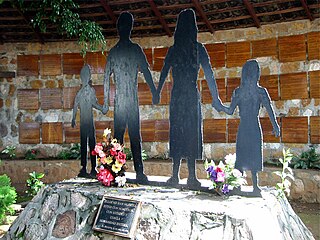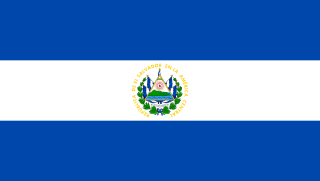The Armed Forces of El Salvador are the official governmental military forces of El Salvador. The Forces have three branches: the Salvadoran Army, the Salvadoran Air Force and the Navy of El Salvador.

The Farabundo Martí National Liberation Front is a left-wing political party in El Salvador.

The Chapultepec Peace Accords were a set of peace agreements signed on January 16, 1992, the day in which the Salvadoran Civil War ended. The treaty established peace between the Salvadoran government and the Farabundo Martí National Liberation Front (FMLN). It was signed in Chapultepec Castle, Mexico.

The El Mozote massacre took place both in and around the village of El Mozote, in the Morazán Department, El Salvador, on December 11 and 12, 1981, when the Salvadoran Army killed more than 811 civilians during the Salvadoran Civil War. The army had arrived in the village on the 10th, following clashes with guerrillas in the area. The Salvadoran Army's Atlácatl Battalion was responsible for the massacre.

Alfredo Félix Cristiani Burkard is a Salvadoran politician who was President of El Salvador from 1989 to 1994.

José Napoleón Duarte Fuentes was a Salvadoran politician who served as President of El Salvador from 1 June 1984 to 1 June 1989. He was mayor of San Salvador before running for president in 1972. He lost, but the election is widely viewed as fraudulent. Following a coup d'état in 1979, Duarte led the subsequent civil-military Junta from 1980 to 1982. He was then elected president in 1984, defeating ARENA party leader Roberto D'Aubuisson.

The Revolutionary Government Junta was the name of three consecutive joint civilian-military dictatorships that ruled El Salvador between 15 October 1979 and 2 May 1982.

The Salvadoran Civil War was a twelve year period of civil war in El Salvador that was fought between the government of El Salvador and the Farabundo Martí National Liberation Front (FMLN), a coalition or "umbrella organization" of left-wing groups backed by the Cuban regime of Fidel Castro as well as the Soviet Union. A coup on 15 October 1979 followed by government killings of anti-coup protesters is widely seen as the start of civil war. The war did not formally end until 16 January 1992 with the signing of the Chapultepec Peace Accords in Mexico City.
Jennifer Jean Casolo is an American citizen who was arrested on November 26, 1989 by Salvadoran government troops during the "Final Offensive" of the Farabundo Martí National Liberation Front (FMLN) in San Salvador.

Salvador Sánchez Cerén is a Salvadoran politician who served as the 42nd President of El Salvador between 1 June 2014 and 1 June 2019. He took office on 1 June 2014, after winning the 2014 presidential election as the candidate of the left-wing Farabundo Martí National Liberation Front (FMLN). He previously served as Vice President under President Mauricio Funes from 2009 to 2014. He was also a guerrilla leader in the Civil War and is the first and only ex-rebel to serve as president.

During the Salvadoran Civil War, on 16 November 1989, Salvadoran Army soldiers killed six Jesuits and two others, the caretaker's wife and daughter, at their residence on the campus of Central American University in San Salvador, El Salvador. Polaroids of the Jesuits' bullet-riddled bodies were on display in the hallway outside the Chapel.
The Salvadoran Civil War was a military conflict that pitted the guerrilla forces of the left-wing Marxist-oriented Farabundo Marti National Liberation Front (FMLN) against the armed and security forces loyal to the military-led conservative government of El Salvador, between 1979 and 1992. Main combatants comprised:

Nayib Armando Bukele Ortez is a Salvadoran politician and businessman who is the 43rd president of El Salvador, serving since 1 June 2019. He is the first president since José Napoleón Duarte (1984–1989) not to have been elected as the candidate of one of the country's two major political parties: the left-wing Farabundo Martí National Liberation Front (FMLN) and the right-wing Nationalist Republican Alliance (ARENA).

The Truth Commission for El Salvador was a restorative justice truth commission approved by the United Nations to investigate the grave wrongdoings that occurred throughout the country's twelve year civil war. It is estimated that 1.4 percent of the Salvadoran population was killed during the war. The commission operated from July 1992 until March 1993, when its findings were published in the final report, From Madness to Hope. The eight-month period heard from over 2,000 witness testimonies and compiled information from an additional 20,000 witness statements.

On December 2, 1980, four Catholic missionaries from the United States working in El Salvador were raped and murdered by five members of the El Salvador National Guard. The murdered missionaries were Maryknoll Sisters Maura Clarke and Ita Ford, Ursuline Dorothy Kazel, and lay missionary Jean Donovan.
The 1979 Salvadoran coup d’état was a military coup d'état that occurred in El Salvador on 15 October 1979. The coup, led by young military officers, bloodlessly overthrew military President Carlos Humberto Romero and sent him into exile. The National Conciliation Party's firm grasp on power was cut, and in its place, the military established the Revolutionary Government Junta of El Salvador (JRG). The junta was composed of two military officers and three civilians.
Death squads in El Salvador were far-right paramilitary groups acting in opposition to Marxist–Leninist guerrilla forces, most notably of the Farabundo Martí National Liberation Front (FMLN), and their allies among the civilian population before, during, and after the Salvadoran Civil War. The death squads committed the vast majority of the murders and massacres during the civil war from 1979 to 1992 and were heavily aligned with the United States-backed government.

The Santa Rita massacre occurred near the town of Santa Rita in Chalatenango, El Salvador, on 17 March 1982. During the massacre, soldiers from the Atonal Battalion attacked and killed four Dutch journalists and a disputed number of guerrillas from the Farabundo Martí National Liberation Front (FMLN).
The final offensive of 1981, also known as the general offensive of 1981, was the unsuccessful first military offensive conducted by the Farabundo Martí National Liberation Front (FMLN) during the Salvadoran Civil War. The objective of the offensive was to initiate a popular revolution to overthrow the Revolutionary Government Junta (JRG), which had been ruling the country since the 1979 Salvadoran coup d'état. The FMLN hoped that the government would be overthrown by 20 January 1981, the date Ronald Reagan was to be inaugurated as president of the United States.
On January 2, 1991, a US military helicopter carrying three American soldiers was shot down by the Farabundo Martí National Liberation Front (FMLN) nearby the village of Lolotique, San Miguel Department, El Salvador. The two surviving soldiers were summarily executed by FMLN forces in one of the most infamous incidents during El Salvador's civil war.












